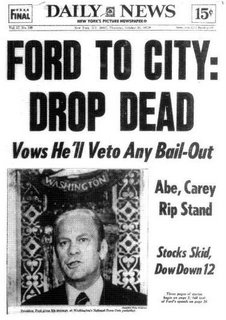Speaking Ill of the Dead
 I hate hagiography, so the last two days have not been kind to me. . . since they’ve been exceedingly and incredibly kind to the newly-late President Gerald R. Ford.
I hate hagiography, so the last two days have not been kind to me. . . since they’ve been exceedingly and incredibly kind to the newly-late President Gerald R. Ford.When looking back at the brief presidency of Gerald Ford, there are far more reasons to spare the encomiums than to spare the rod. The names Rumsfeld and Cheney are among the topmost, but let me turn briefly to another negative that so very many seem to be pointing to as a positive—that would be the pardoning of Richard Nixon but a month after his resignation and Ford’s “promotion.”
So many in the last two days are pushing the notion that President Ford’s pardoning of Nixon was some great and selfless act of leadership. I see it (as I saw it then) as a cynical and selfish act of cowardice. Whether or not there was a “deal” to have Ford quickly pardon Nixon if Nixon resigned, if it is to be argued that Ford’s pardon made it easier for Nixon to resign—got him out of office before he had a total meltdown—then, no matter what you might call it, a deal was what it was. You can’t praise that end while denying that it came as result of a deal.
Yet, many do just that. And they praise the “healing” that Ford began with his pardon, pursuing this “noble” course even though it eventually (maybe) cost him reelection. First, let it be understood that there was nothing healing about that pardon—to call it so would be to say that you could heal a cut by forgiving the knife. What Ford did do was short-circuit the rule of law by pardoning a man before he had been tried or convicted of a crime, and short-change the American people by preventing a full public hearing of the shamed former President’s misdeeds.
Gerry Ford did not pardon Tricky Dick to heal a country in spite of the political fallout, he moved as quickly as he did because he thought that a protracted court battle would be deleterious to his personal political fortunes and to the future electoral success of the Republican Party. Ford pardoned Nixon in an attempt to put the matter to bed—to sweep it under the rug before the coming election cycle. Our “long national nightmare” was not over, but Ford was hoping that by pardoning Nixon, the scandal that was to persist as his and his party’s political nightmare was.
That was the kind of “level-headed” leadership that we now find our press and punditocracy praising.
And, if you want another example of the particular profile in courage that Gerald Ford happened to cut throughout his life, than look no further than today’s Washington Post. There, you will see a story, based on an “embargoed” interview with none other than Bob “I’m saving it for my book” Woodward, about Ford’s strong criticism of George W. Bush and the Invasion of Iraq. “I don’t think I would have gone to war,” said Ford, and, “I just don't think we should go hellfire damnation around the globe freeing people, unless it is directly related to our own national security."
Ford also had a few choice words for his former Chief of Staff:
“I think Cheney has become much more pugnacious" as vice president. He said he agreed with former secretary of state Colin L. Powell's assertion that Cheney developed a "fever" about the threat of terrorism and Iraq. "I think that's probably true."
All of this was said in July of 2004—yes, three months before the crucial and closely contested presidential election—but was kept under raps until now because of an agreement between Ford and Woodward,
Would a rebuke from this supposedly levelheaded and courageous elder statesman have prevented Bush from going to war? Not likely, I must admit. Could such a non-endorsement from a fellow Republican and ex-president flipped enough votes in Ohio or New Mexico or Florida to propel John Kerry to the presidency? Hard to say. Would it be the courageous thing to express your thoughts when they might have some impact? Even for a guy who played a few too many football games without a helmet, that should have been a no-brainer.
Gerald Ford might have been a nice guy, and, when compared with some of the cynical Republican Presidents that followed him, maybe he seems honest or, at least, bipartisan. But, if we let history be the judge—instead of the appointed and self-appointed healers of an ill legacy—then it is clear that the Ford we now honor was neither the right man for the time nor a president for the ages.
(cross-posted from guy2k; cross-posted to Daily Kos)


0 Comments:
Post a Comment
<< Home